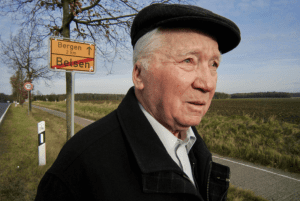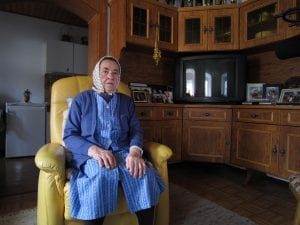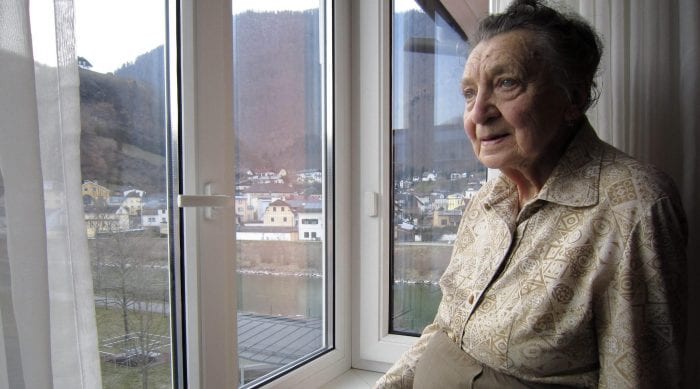Reviewed by Jeffrey Sanzel
Holocaust survivor and Nazi hunter Simon Wiesenthal spoke of the biological solution whereby victims and perpetrators have died, and there are no longer firsthand witnesses. Director-producer Luke Holland’s Final Account is an extraordinary documentary that adds an important addition to the history of the Shoah. Holland, who died shortly after post-production, conducted over three hundred interviews. He created a simple but riveting ninety minutes encompassing the stories of guards, soldiers, and citizens of Hitler’s Germany.
All told in their own words.

In Final Account, dozens of men and women in their eighties and nineties share their experiences before and during the war. They discuss and reflect on their culpability in the post-World War II world. The range of reactions is a broad cross-section, with denial being the strongest component. However, these are not the victims and survivors; they are predominantly ordinary people who wanted to live their lives and have been allowed to do so.
Some recall the songs they sang — including lyrics about sharpening their blades so that they would easily go into the bellies of the Jews. Listening to the ease in which they sing is something not easily forgotten. Several display Nazi party cards that they have preserved along with their medals. Many point to the fact that they were young and just went along with expectations. Others look back on it as an idyllic time of great patriotism, celebrating their country with picnics and swimming with the Hitler Youth.
All told in their own words.
One man recalls taking part in the boycott of Jewish stores when he was only nine years old. Another cites the influence of his teacher being stronger than that of his parents. Many insist that they had no idea what was going on in the camps that were barely a few miles from their homes; others put the lie to this in admitting that they could smell the burning of the bodies. There is pride and nostalgia; there is horror and guilt.
All told in their own words.
“I wasn’t there” is juxtaposed with “I couldn’t say anything, or I would have ended up there.” Communities embraced the presence of the concentration camps, as they were good for the local economy, bringing soldiers and guards to live in their towns and shop in the stores.
All told in their own words.
A few take responsibility for their participation. One man acknowledges his cowardice and wishes that he had stood up for the victims. Others accept some culpability; they do this without quite saying, “I was just following orders” — the watch cry of so many of Hitler’s regime of extermination. One woman hid her S.S. fiancé from the allies, but “he wasn’t a Nazi,” she insists.
All told in their own words.
The interviews shift from person to person, frequently returning to a handful who show the startling spectrum of attitudes. Interspersed are historical film clips, many in color, and seen here for the first time. Some of the most disturbing show hundreds of young people marching, laughing, and reveling in their experiences.

Two segments come near the close of the film. The first is a man confronting a group of German students, trying to make them understand what he did was wrong; he truly believes that his actions ultimately disgraced his country. The teenagers’ responses range from indifferent to hostile, not wanting to hear him embrace his guilt. The scene takes place at the villa in the Berlin suburb of the Wannsee Conference, the notorious meeting where the Nazi elite planned “the final solution” to exterminate all European Jewry.
The final interview is with a man who takes great pride and has no regret. He feels Hitler had the “correct” idea. When asked about murdering the Jews, he answers that no, they should not have been killed. They should have just been sent somewhere else.
All of this … all of this in their own words.
————————————————
I have been reviewing for TBR News Media for the past three years. For the most part, I have kept my voice quiet in these writings. However, in this case, I feel there is something worth sharing.
I am the author of From the Fires: Voices of the Holocaust, a play presented by Theatre Three in Port Jefferson. It has been touring for nearly 25 years, with over 1,000 performances in schools, synagogues, churches, and community centers across Long Island. It has been seen as far north as outside of Toronto and as far south as Washington, D.C.
The first performance, in October of 1996, was met with complete silence. Then, after several minutes, a man raised his hand. “I was a graduate of Auschwitz and an alumnus of the death march,” he said. “Everything that happened in your play happened. I was there.”
The man’s name was Max Temkin. Both he and his wife were Holocaust survivors. We became friends and remained close over the next twenty-plus years. I had the pleasure of hearing him speak many times, sharing with students his unfathomable experience. What came through was his appreciation for the life he made afterward: his love for his wife and family and his deep gratitude for this country that welcomed him and became his home.
I saw Final Account on Saturday, leaving the movie theater at 5:00 p.m. At 6:30 p.m., Max passed away at the age of 99, with his daughter Marilyn at his side.
I ask you to see Final Account. I urge you to seek out the many films and books that are available. Holocaust survivor Werner Reich, the most engaging, honest, and powerful speaker I have ever heard, continues to share his history and insight; please seek out an opportunity to hear him.
Memory and education are the weapons against ignorance and hate.
Please do this for yourself. For your friends. But most of all, do it for the generations to come.
“The only thing necessary for the triumph of evil is for good people to do nothing.”
— Edmund Burke (1770)





